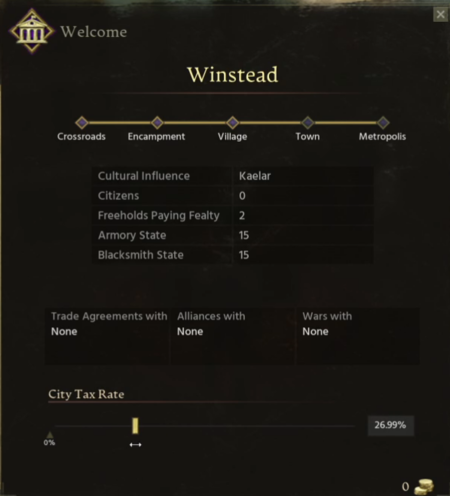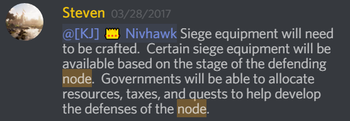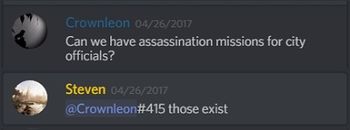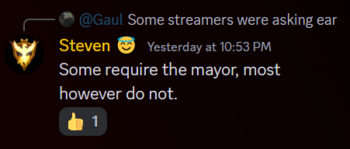Node wars
Node-Regierungen können einer anderen Node den Krieg erklären und Bürger für die Sache gewinnen. [1]
- Dadurch werden die Bürger der kriegführenden Node, einschließlich ihrer Verbündeten, gegenseitig als Kombattanten gekennzeichnet. [2]
- Die Aufträge sozialer Organisationen sind entweder kooperativ oder gegnerisch, basierend auf dem Kriegsstatus ihrer übergeordneten Node. [2]
- Vasallen-Nodes können ihrer übergeordneten Node oder ihren anderen Vasallen keinen Krieg erklären. [3]
- Node-Kriege können jederzeit ausgerufen werden, aber die Ziele erscheinen nur während der Server Prime-Time.[4]
- Spieler können sich während des Krieges jederzeit gegenseitig töten (nicht nur während der Server Prime-Time).[4]
- We have conditions that you can set between nodes with regards to either nodes being friendly with each other and acting trade alliances, or they can declare war on nodes similar to how guild wars may function in different games, where those citizens become hostile to each other based on the player government that's elected in the particular node. So those systems all cater to allowing a conflict that's meaningful and that also provides a non-imbalanced relationship between stronger guilds and not as strong guilds.[5] – Steven Sharif
Server prime-time
Objective-based PvP events such as node sieges, castle sieges, guild wars, and node wars will occur within a prime-time window somewhere between 3PM and 9PM server time. This is subject to testing.[6][7][8]
- Guild wars and node wars can be declared at any time, but the objectives will only spawn during the prime-time window.[4]
Node-to-node reputation
Node-to-node reputation activities include trade agreements and wars between nodes.[10][11]
- Completing mayoral commissions will reward node-to-node reputation.[10][12]
Führungsbefugnisse

The government has a lot of say in the direction of the node's development. Directing assets, building projects, tax allocation, defensive ability etc. Players have the ability to not only create these cities, but they have the right of self-governance.[14]
Mayoral leadership powers are granted to mayors via the use of mandates.[15][16]
- Initiate buy orders using gold from the node treasury.[10][17][18][19]
- Initiate mayoral commissions to aid node development.[10][12][18][15][20][14]
- Adjust node taxes.[10][15][21] This includes setting tax rates that apply to tavern games.[22][23]
- Tax money may only be used to fund node development.[24]
- Initiate service building construction and expansions.[10][15]
- Improving node defensive structures, such as stronger walls and gates, traps, and siege equipment.[20][25][26][27][14]
- Hiring mercenary NPCs to defend the node during sieges.[28][14]
- Set a message-of-the-day for the node.[29]
- Proposing node policies that are voted on by citizens.[11][9][20]
- Mayors won't have formal systems to carry out surveys/polls of node citizens, but they will be able to utilize node citizen chat or message-of-the-day services.[29]
- Mayors may have special color names in node chat channels.[29]
- Entering into trade agreements with other nodes.[10][11][1]
- Mayors cannot denote players as enemies of the state.[31] Previously this was a potential option.[1][32]
- Mayors are notified when their node is named on a siege declaration scroll.[33]
- Mayors and lords of castles have spells they can use on the battlefield with high effect and long cooldowns for their teams.[34]
- Mayors gain new powers and responsibilities as their node advances.[3]
- Some leadership powers are specific to node type, biome, or dominant race, others are universal.[37]
- There definitely are differences... Some of the things that mayors can do are more universal, but then some systems have very specific if your node has a certain dominant race, or your node is a certain type, or it's in a certain biome. So there's even differences between where it is too.[37] – Chris Justo
- If a mayor does not make certain decisions within a set period of time then the system will make a decision for them.[39][40]
- Q: The idea behind all these nodes are awesome, but I wonder how it will actually play out in the live version. The problem is having player run or the problem with having player run towns is that people come and go in video games. So, will towns die out etc?
- A: We incorporate as part of those designs certain fail-safes, certain protections, certain automated progression that takes over when some of those decisions are lacking or are not made; and those decisions can be defaulted. Now, of course, that would have a deleterious effect on the direction that a particular node might want to go, because they're going to be doing default behaviors, or default actions, as opposed to something that might be in line with the strategic objective of that particular node, or the specialization that the node has previously been attempting to do. But that is why we have a regularly recurring election period where players can take the reins of power and can elect someone else to come in and participate and and re-right the ship, so to speak. So it is absolutely a component of having player-driven mechanics that there is an opportunity for things to be less than ideal, or less than strategic when certain bad-faith actors or people leave, but there are safeguards in place.[39] – Steven Sharif
Node politics
Innerhalb der Node wird es keine Bürgerkriegsmechanik geben, aber es wird Spielraum für interne politische Konflikte geben; wie die Untergrabung der derzeitigen Führung und die Störung des Handels.[45]
- Die einzige Möglichkeit, einen gewählten Bürgermeister vor Ablauf seiner Amtszeit zu entfernen, besteht darin, die Node zu zerstören. [46]
Wir möchten, dass die Konsequenzen eine Rolle spielen, und wenn diese Person gewählt wurde, müsst ihr mit den Mitteln der Mechanik arbeiten, um sie abzuwählen.[46] – Steven Sharif
Node-Belagerungen
Node-Belagerungen ermöglichen es Spielern, eine Node zu zerstören.[48] Dies ebnet den Weg für die Neuentwicklung und den Zugriff auf die gesperrten Inhalte in den umliegenden Nodes. Aufgrund dieser Dynamik spielen politische Konflikte und Intrigen eine wichtige Rolle in der Struktur der Welt.[49]
Angriffe auf Nodes werden für die Angreifer eine Herausforderung darstellen. Städte und Metropolen werden einen erheblichen Abwehrvorteil haben. [49]
Wenn du ein Haus in einem Nodepunkt besitzt und nicht möchtest, dass dieses Haus zerstört wird, müsst du diese Stadt verteidigen![50] – Steven Sharif
Der Großteil (~80%) der Inhalte in Ashes of Creation sind open-world, möglicherweise kann es jedoch instanziierte Kämpfe innerhalb von Burg- und Node-Belagerungen geben, bei denen bestimmte Gruppen an kleinen, kurzzeitigen zielbasierten Kämpfen um bestimmte Zwischenziele teilnehmen können.[51]
Bestrafungen für den Tod gelten nicht für zielbasierte Events (wie Karawanen, Gildenkriege, und Node-Belagerungen).[52]
Siehe auch
Einzelnachweise
- ↑ 1.0 1.1 1.2 1.3 City hall.
- ↑ 2.0 2.1 Interview, 2020-07-19 (24:34).
- ↑ 3.0 3.1 Blog - Know Your Nodes - The Basics.
- ↑ 4.0 4.1 4.2

- ↑ Video, 2018-04-05 (41:48).
- ↑ Interview, 2020-07-29 (31:05).
- ↑ Interview, 2020-07-18 (13:13).
- ↑ Interview, 2020-07-08 (22:37).
- ↑ 9.0 9.1 Liveübertragung, 2022-08-26 (1:12:40).
- ↑ 10.0 10.1 10.2 10.3 10.4 10.5 10.6 Blog: Development Update with Village Node.
- ↑ 11.0 11.1 11.2 Liveübertragung, 2023-08-31 (44:21).
- ↑ 12.0 12.1 Liveübertragung, 2023-08-31 (39:17).
- ↑ Liveübertragung, 2018-12-12 (14:48).
- ↑ 14.0 14.1 14.2 14.3 14.4 14.5 14.6 MMOGames interview, January 2017
- ↑ 15.0 15.1 15.2 15.3 Liveübertragung, 2023-08-31 (31:44).
- ↑ Liveübertragung, 2017-11-17 (9:49).
- ↑ Liveübertragung, 2023-08-31 (59:43).
- ↑ 18.0 18.1 Interview, 2020-07-08 (1:04:05).
- ↑ 19.0 19.1 Liveübertragung, 2017-06-30 (53:57).
- ↑ 20.0 20.1 20.2 20.3 Liveübertragung, 2022-04-29 (27:42).
- ↑ Liveübertragung, 2020-03-28 (1:03:38).
- ↑

- ↑

- ↑

- ↑ Liveübertragung, 2020-07-25 (1:22:40).
- ↑ Liveübertragung, 2018-01-18 (37:05).
- ↑

- ↑ Liveübertragung, 2020-06-26 (59:11).
- ↑ 29.0 29.1 29.2 Liveübertragung, 2023-08-31 (35:23).
- ↑ Liveübertragung, 2023-08-31 (29:04).
- ↑ Liveübertragung, 2023-08-31 (30:41).
- ↑

- ↑ Liveübertragung, 2021-12-23 (1:30:34).
- ↑ 34.0 34.1

- ↑ Liveübertragung, 2020-07-25 (1:52:45).
- ↑ Liveübertragung, 2023-08-31 (41:15).
- ↑ 37.0 37.1 Liveübertragung, 2023-08-31 (28:30).
- ↑

- ↑ 39.0 39.1 Video, 2023-09-29 (1:52).
- ↑ Liveübertragung, 2023-08-31 (29:33).
- ↑

- ↑ Liveübertragung, 2017-05-19 (36:05).
- ↑ Liveübertragung, 2017-05-19 (36:09).
- ↑
- ↑ Liveübertragung, 2017-05-24 (40:50).
- ↑ 46.0 46.1 Liveübertragung, 2019-06-28 (1:26:14).
- ↑ Video, 2016-12-04 (0:02).
- ↑ Blog - Know Your Nodes - Advance and Destroy.
- ↑ 49.0 49.1 A reactive world - Nodes.
- ↑ Video, 2017-04-30 (5:31).
- ↑ Liveübertragung, 2022-01-28 (17:50).
- ↑ Liveübertragung, 2020-12-22 (1:13:51).

